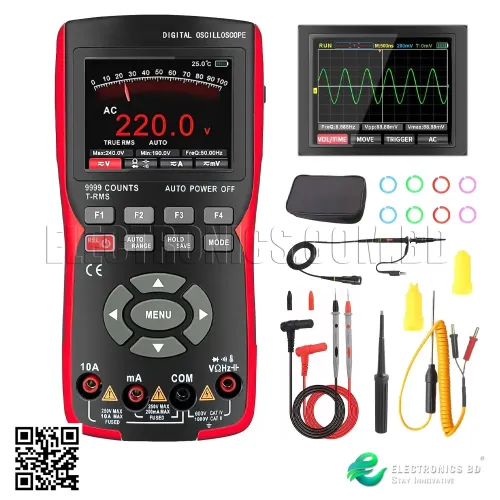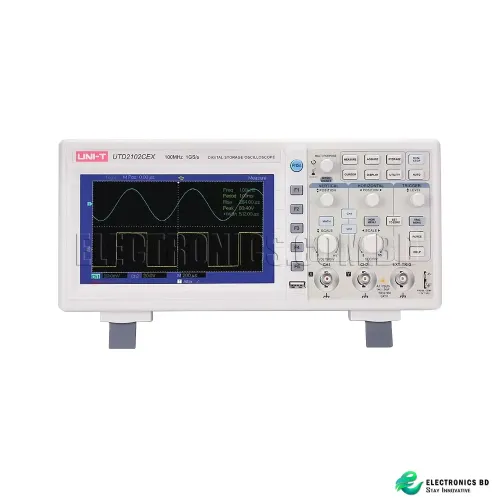ESP32 Development Board ESP32-C3 CORE-ESP32-C3 CH343P WiFi + Bluetooth Module Core Board For Arduino Microphone UART GPIO SPI
- 3D printers & CNC
- Accessories
- Active Components
- All Departments
- CNC Accessories
- Electrical Accessories & IOT
- Latest
- Oscilloscope
- Passive Components
- Projects
- SMD Components
- Socket, Port & Jacks
- Sound Systems
- Drones & RC Hobby
- Sale
Your shopping cart is empty!
Specifications:
- CORE-ESP32-C3
- ESP32-C3 main control, main frequency 160MHz
- On board 4MB flash,
- CH343P chip
- SPL Flash: 1 channel, onboard 4MB
- UART interface: 2-way, UART0~UART1
- 12 bit ADC: 2 channels, with a maximum sampling rate of 100KSPS
- Low speed SPI interface: 1 channel, supporting main mode
- IIC controller: 1 channel
- PWM interface: 4 channels
- GPIO external pins: 15 channels, reusable
- LED indicator lights: 2 channels
- Reset button: 1 channel
- BOOT button: 1 channel
- USB to TTL download and debugging port: 1 channel, supporting automatic download
- 2.4G PCB onboard antenna
- Size: 21mm x 51mm
Package:
1x ESP32 Development Board ESP32-C3 CORE-ESP32-C3 CH343P WiFi + Bluetooth Module Core Board For Arduino Microphone UART GPIO SPI
Product Description
Features:
- Main Control: ESP32-C3 microcontroller with 160MHz frequency.
- Memory: 4MB onboard flash.
- Wireless Connectivity: Supports Wi-Fi 802.11 b/g/n and Bluetooth 5.0 (LE 1M PHY).
- Interfaces:
- 2 UART channels for serial communication.
- 1 SPI interface for low-speed peripherals.
- 1 IIC controller for connecting sensors and other I2C devices.
- 4 PWM channels for controlling motors, LEDs, and other actuators.
- 2 12-bit ADC channels for analog input with up to 100KSPS sampling rate.
- GPIO: 15 reusable GPIO pins for various input/output needs.
- Additional Components:
- 2 LED indicator lights for status and debugging.
- Reset and BOOT buttons for easy control and programming.
- USB to TTL port supporting automatic download and debugging.
- Power Supply: Operates on 3.3V, powered through USB connection.
- Antenna: Onboard 2.4G PCB antenna for reliable wireless communication.
- Compact Design: Dimensions of 21mm x 51mm, suitable for compact applications.
The ESP32-C3 CORE-ESP32-C3 Development Board is a robust and versatile module designed for a wide range of applications including IoT,
home automation, and embedded systems. It features the ESP32-C3 main control with a 160MHz frequency, 4MB onboard flash, and a CH343P chip for
USB to TTL conversion. With its extensive range of interfaces and connectivity options, this development board is ideal for both beginners and advanced users.
Frequently asked questions (FAQs):
1. How do I program the ESP32-C3 development board?
Answer: The ESP32-C3 development board can be programmed using the Arduino IDE or other compatible development environments such as PlatformIO. Connect the board to your computer using a USB cable, install the necessary drivers (if required), and select the appropriate board and COM port in the IDE. Use the built-in libraries to start developing your projects.
2. What power supply is needed for the ESP32-C3 development board?
Answer: The board can be powered via the USB port, which supplies 5V to the board. This makes it easy to use with standard USB power sources such as computer USB ports or USB wall adapters.
3. What are the key wireless features of the ESP32-C3 development board?
Answer: The ESP32-C3 supports both Wi-Fi 802.11 b/g/n and Bluetooth 5.0 (LE 1M PHY), making it suitable for a variety of wireless applications. These features allow the board to connect to Wi-Fi networks and communicate with other Bluetooth-enabled devices.
4. Can I use the ESP32-C3 development board for IoT projects?
Answer: Yes, the ESP32-C3 development board is well-suited for IoT projects. Its wireless connectivity, multiple interfaces, and GPIO pins make it ideal for connecting various sensors, actuators, and other devices commonly used in IoT applications.
5. What interfaces are available on the ESP32-C3 development board?
Answer: The board includes a variety of interfaces:
- 2 UART channels for serial communication.
- 1 SPI interface for connecting SPI devices.
- 1 IIC controller for I2C devices.
- 4 PWM channels for controlling peripherals like motors and LEDs.
- 2 12-bit ADC channels for analog input.
Similar Products:
LILYGO® TTGO T-Display ESP32 WiFi And Bluetooth Development Board
Arduino Pro Mini 328 - 5V/16MHz
Arduino Nano ATmega328p (High Quality)
















